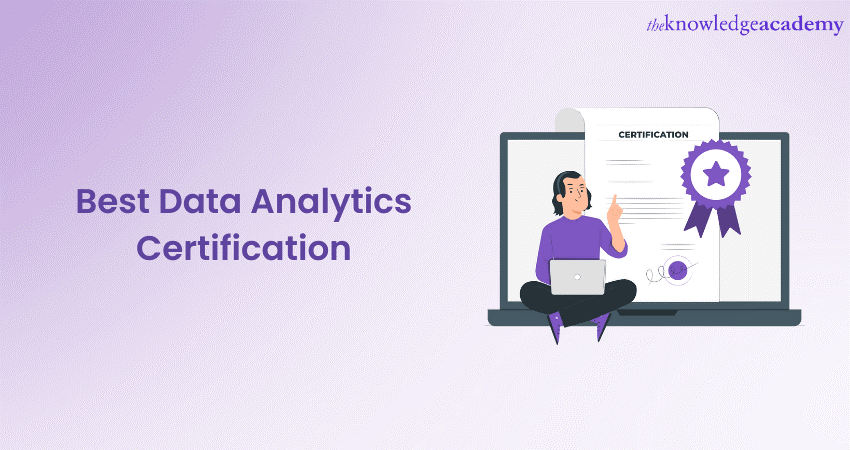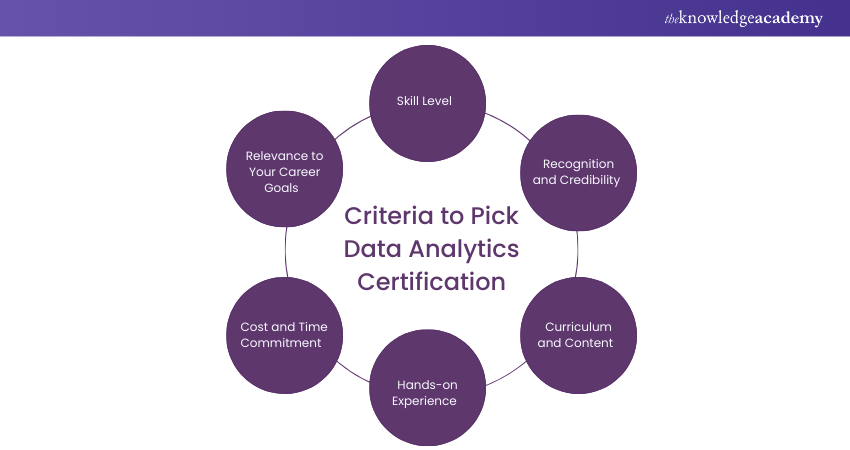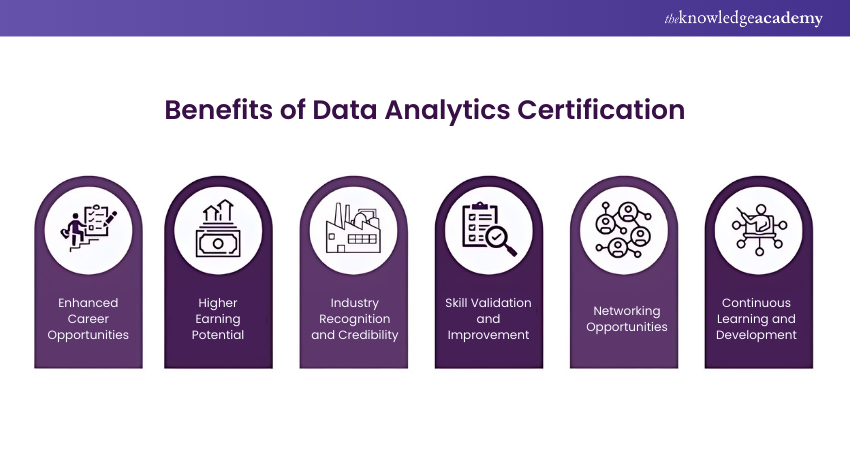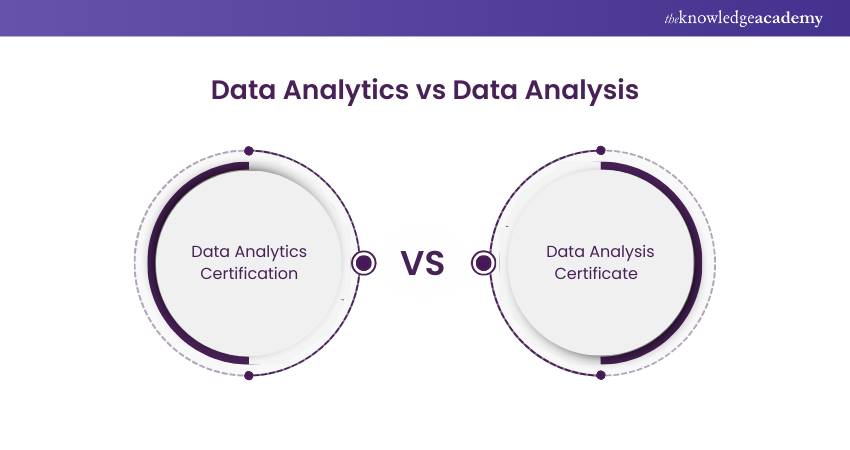We may not have the course you’re looking for. If you enquire or give us a call on +44 1344 203 999 and speak to our training experts, we may still be able to help with your training requirements.
We ensure quality, budget-alignment, and timely delivery by our expert instructors.

In the modern world that relies on data, having the correct qualifications distinguishes you. So, selecting the Best Data Analytics Certification can greatly influence your professional career. Having the top certification will not only improve your abilities but also confirm your knowledge, positioning you as a valuable resource in any field.
These certifications encompass a broad scope of subjects, ranging from basic principles to sophisticated analytics methods. They are created for businesses in need of professionals who can transform data into useful insights. If you are starting out or want to progress, obtaining the Best Data Analytics Certification will provide you with an advantage in the fast-growing data analytics industry.
Table of Contents
1) Criteria for Choosing the Best Data Analytics Certification
2) Top Data Analytics Certifications
3) Benefits of Getting a Data Analytics Certification
4) How is Data Analytics Certification Different From Data Analysis Certificate?
5) Conclusion
Criteria for Choosing the Best Data Analytics Certification
Choosing the right Data Analytics Certification is a pivotal decision that can significantly impact your career trajectory. To make an informed choice, it's essential to consider several key criteria:

1) Relevance to Your Career Goals
The first and foremost consideration is how well the certification aligns with your career aspirations. Different certifications cater to various roles within the Data Analytics spectrum. For instance, some may focus on Data Visualisation, while others delve into advanced analytics or Big Data processing.
2) Skill Level
Data Analytics Certifications come in a range of difficulty levels, from beginner to advanced. Assess your current proficiency in Data Analytics. If you're just starting out, a foundational certification will provide you with the necessary fundamentals.
3) Recognition and Credibility
Opt for certifications that hold industry-wide recognition and credibility. Certifications from reputable institutions, like top universities or major tech companies, are more likely to be valued by employers. .
4) Curriculum and Content
Scrutinise the content of the certification program. A comprehensive curriculum should cover a broad range of topics relevant to Data Analytics. Look for courses that include data collection, cleaning, analysis, visualisation, and interpretation. Additionally, certifications that incorporate hands-on projects or case studies provide practical, real-world experience.
5) Hands-on Experience
Practical application of skills is crucial in Data Analytics. Ensure that the certification program offers opportunities to work on projects or exercises that simulate real-world scenarios. This hands-on experience not only reinforces theoretical knowledge but also demonstrates your ability to apply it effectively.
6) Cost and Time Commitment
Consider the financial investment and time required to complete the certification. Some certifications may be more cost-effective or time-efficient than others. Balance your budget and schedule with the expected benefits and outcomes of the certification.
Top Data Analytics Certifications
The information and data are significant tools for making decisions at various crucial levels, including businesses, policies and finances. With the help of a good certification in Data Analytics, you can leverage this skill and enhance your career efficiently. The following are some of the top Data Analytics Certifications.
1) Data Analytics With R Certification
The Data Analytics with R Training equips you with the skills to perform advanced data analysis using the R programming language. This course covers essential concepts in data manipulation, statistical analysis, and visualisation within R, enabling you to derive actionable insights from complex datasets. Ideal for professionals aiming to enhance their data analytics capabilities, this certification provides the expertise needed to leverage R for robust data-driven decision-making, making you a valuable asset in the field of analytics.
2) Microsoft Power BI Data Analyst PL300
The Microsoft Power BI Data Analyst PL300 Certification validates your ability to use Power BI for effective data analysis and reporting. It covers key skills such as data preparation, data modelling, and visualisation, enabling you to create insightful reports and dashboards that drive business decisions. This certification is ideal for professionals looking to enhance their expertise in transforming raw data into actionable insights, making it a valuable credential for advancing your career in Data Analytics.
3) Advanced Data Analytics Certification
The Advanced Data Analytics Certification equips you with in-depth knowledge and skills to handle complex data sets and perform sophisticated analysis. This course covers advanced techniques in data modelling, predictive analytics, and Machine Learning, enabling you to extract valuable insights from large volumes of data.
Ideal for professionals seeking to elevate their analytical capabilities, this certification enhances your ability to make data-driven decisions, optimise business processes, and drive innovation in your organisation.
4) Certified Artificial Intelligence for Data Analysts
The Certified Artificial Intelligence for Data Analysts Certification provides comprehensive knowledge in applying AI techniques to data analysis. This course covers key AI concepts, Machine Learning algorithms, and how to integrate these into Data Analytics processes to uncover deeper insights.
Ideal for data professionals looking to expand their skill set, this certification enhances your ability to use AI tools to automate and optimise data-driven decision-making, making you a valuable asset in the growing field of AI and Data Analytics.
5) CompTIA Data+ Certification
The CompTIA Data+ Certification is a widely recognised credential tailored for professionals aiming to validate their expertise in data management and analytics. It signifies a high level of proficiency in handling and analysing data within a business context. This certification covers a comprehensive range of topics crucial for effective data management. It encompasses areas such as data governance, data quality, data architecture, and database management systems.
The strength of the CompTIA Data+ certification is its vendor-neutral approach. This means that it is not tied to any specific technology or platform, allowing professionals to apply their knowledge across a variety of systems and tools.
Build your Data Analytics skills with our expert-led CompTIA Data+ Training – Register now!
6) Data Science Analytics Certification
The Data Science Analytics Training equips you with the skills to extract, analyse, and interpret complex data. This course covers essential techniques in data mining, statistical analysis, and Machine Learning, enabling you to transform raw data into actionable insights.
Ideal for professionals aiming to advance their careers in Data Science, this certification enhances your ability to make data-driven decisions and solve complex problems, positioning you as a key player in the data-driven world.
7) Tableau Desktop Certification
While not strictly a Data Science Certification, Tableau is a pivotal tool in the Data Analyst and data scientist toolkit for visualisation. The Tableau Desktop Certification focuses on the effective use of Tableau for creating impactful visualisations and dashboards. It's an excellent choice for professionals looking to enhance their data presentation skills and effectively communicate insights derived from data.
Transform your insights into impactful stories with our Tableau Desktop Training – join now!
8) Hadoop Big Data Certification
The Hadoop Big Data Training provides you with the expertise to manage and process large datasets using the Hadoop ecosystem. This certification covers key components like HDFS, MapReduce, and Apache Pig, equipping you with the skills to handle Big Data challenges efficiently. Ideal for data professionals seeking to master Big Data technologies, this certification enhances your ability to manage, analyse, and extract insights from massive datasets, making you an essential asset in any data-driven organisation.
Benefits of Getting a Data Analytics Certification
Obtaining a Data Analytics Certification offers a multitude of advantages for professionals in today's data-driven landscape. Here are some key benefits:

a) Enhanced Career Opportunities: A Data Analytics Certification sets you apart in a competitive job market. It demonstrates to employers that you have the skills and knowledge to excel in the field of Data Analytics.
b) Higher Earning Potential: Certified Data Analysts tend to earn good salaries compared to their non-certified counterparts. This is because certifications validate your expertise, making you a more valuable asset to employers.
c) Industry Recognition and Credibility: Reputable certifications are recognised and respected within the industry. They serve as a stamp of approval from established organisations or institutions, adding credibility to your resume.
d) Skill Validation and Improvement: Certification programs cover a range of topics and often involve hands-on projects. This not only validates your existing skills but also provides opportunities to enhance and refine them.
e) Networking Opportunities: Certification programs often include access to communities where you can connect with fellow professionals, share knowledge, and stay updated with industry trends. This networking can lead to new job opportunities and collaborations.
f) Continuous learning and development: Many certification programs require ongoing education or recertification, which encourages professionals to stay updated with the latest improvements in Data Analytics.
How is Data Analytics Certification Different From Data Analysis Certificate?
While both terms may seem similar, they represent distinct educational pathways and opportunities. Following is an explained discussion to help you understand the difference between the two:

1) Data Analytics Certification
A certification in Data Analytics usually covers various subjects like advanced analytics methods, machine learning, and Big Data Analysis. It is designed for people aiming to become skilled at uncovering insights from intricate, sizable datasets. This certification is perfect for individuals aiming for positions such as Data Scientist, Machine Learning Engineer, or Advanced Analytics Specialist.
2) Data Analysis Certificate
A typical Data Analysis Certificate includes fundamental skills like data cleansing, visualisation, and basic statistical analysis. Having a solid understanding of data manipulation and interpretation makes it well-suited for beginner Data Analyst positions. This certificate is a great beginning for individuals who want to establish a strong base in Data Analysis before moving on to more advanced roles with additional certifications or education.
Conclusion
Selecting the Best Data Analytics Certifications is crucial for moving forward in your career. Obtaining certifications such as Certified Analytics Professional (CAP), Google Data Analytics, and Microsoft Certified provides you with necessary skills. These qualifications not just affirm your skill but also enhance your attractiveness in a tough job market.
Whether you are just beginning or seeking to improve your skills, obtaining a recognised certification can increase your confidence and provide access to new possibilities. By choosing the correct certification, you can set yourself up for success in the ever-changing realm of data analytics.
Unlock the power of data with our comprehensive Data Science & Analytics Training. Sign up now!
Frequently Asked Questions
Which Certificate is Good for a Data Analyst?

The CAP certification is well respected among Data Analysts. It includes vital abilities and is acknowledged worldwide. Additional excellent choices are the Google Data Analytics Certificate and the Microsoft Certified Data Analyst Associate.
What Qualifications do I Need to be a Data Analyst in the UK?

In the UK, a Data Analyst usually requires a degree in a relevant area such as mathematics, statistics, or computer science. It is essential to have expertise in software such as Excel, SQL, and Python. Certifications like CAP or Google Data Analytics improve job opportunities.
What are the Other Resources and Offers Provided by The Knowledge Academy?

The Knowledge Academy takes global learning to new heights, offering over 3,000 online courses across 490+ locations in 190+ countries. This expansive reach ensures accessibility and convenience for learners worldwide.
Alongside our diverse Online Course Catalogue, encompassing 19 major categories, we go the extra mile by providing a plethora of free educational Online Resources like News updates, Blogs, videos, webinars, and interview questions. Tailoring learning experiences further, professionals can maximise value with customisable Course Bundles of TKA.
What is The Knowledge Pass, and How Does it Work?

The Knowledge Academy’s Knowledge Pass, a prepaid voucher, adds another layer of flexibility, allowing course bookings over a 12-month period. Join us on a journey where education knows no bounds.
What are the Related Courses and Blogs Provided by The Knowledge Academy?

The Knowledge Academy offers various Big Data and Analytics Training, including the Advanced Data Analytics Course, Data Science Analytics, and Big Data Analysis. These courses cater to different skill levels, providing comprehensive insights into What is Data Analytics.
Our Data, Analytics & AI Blogs cover a range of topics related to Big Data Analysis, offering valuable resources, best practices, and industry insights. Whether you are a beginner or looking to advance your Data Analytics skills, The Knowledge Academy's diverse courses and informative blogs have got you covered.
Upcoming Data, Analytics & AI Resources Batches & Dates
Date
 Advanced Data Analytics Course
Advanced Data Analytics Course
Mon 19th May 2025
Mon 11th Aug 2025
Mon 13th Oct 2025
Mon 8th Dec 2025






 Top Rated Course
Top Rated Course



 If you wish to make any changes to your course, please
If you wish to make any changes to your course, please


